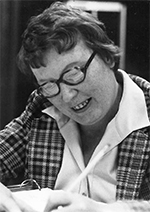
Physical therapy thought leader Rosemary Scully, PT, EdD, FAPTA, whose tireless passion for learning left a lasting imprint on physical therapist clinical education, has died. She was 83 years old.
Scully was born in West Virginia and earned her first degree—a baccalaureate in physical education—from West Virginia University. She later received a master's degree in physical therapy and a doctorate in education from Columbia University in New York. Along the way, Scully dedicated herself to applying what she had learned to improve the physical therapy profession, particularly related to education.
Her work and educational efforts eventually took her to the University of Pittsburgh, where she led the university's physical therapy program until her retirement in the early 1990s. Scully's legacy lives on at Pitt through the Scully Scholar Lecture Series, an annual event that features some of the most prominent voices in the physical therapy profession.
Scully authored several influential reports, studies, and books, including "Cooperative Planning for Clinical Experience in Clinical Therapy" and the comprehensive textbook, Physical Therapy, published in 1989. In addition, she was a coeditor of the Studies in the Health Related Professions series of publications, and within that series, a coauthor of several books focused on physical therapist and physical therapist assistant faculty characteristics.
A member of APTA since 1958, Scully was vice speaker of the APTA House of Delegates from 1977 to 1983. In 1989, she received the association's Lucy Blair Service Award, and was named a Catherine Worthingham Fellow in 1992.
Scully's love for the physical therapy profession—and particularly for the learning opportunities it presents—shone through in a recap of an oral history she provided to APTA in 1999. In that recap, published in the association's PT Magazine in 2000, Scully described what she viewed as one of the profession's greatest assets.
"I was very fortunate to find physical therapy, a profession where I could, as an individual, do whatever it is that I wanted to do, while at the same time, other folks in the same field are doing entirely different kinds of things," Scully said. "I was always pleased with its diversity. Physical therapy is eclectic. It brings in all different kinds of people: wonderful folks who are pioneers and push the field forward."